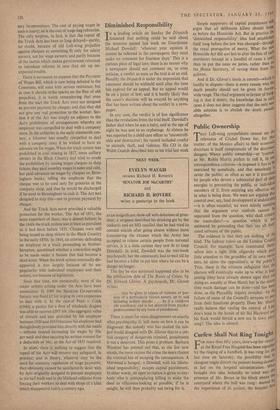Diminished Responsibility
'N a leading article on Sunday the Dispatch lamented that nothing could be said about the sentence passed last week on Guardsman Michael Dowdall : 'whatever your opinion it cannot be reflected in the newspapers; they must make no comment for fourteen days.' This is a curious piece of legal lore; there is no reason why a newspaper should not comment on, or even criticise, a verdict as soon as the trial is at an end. Possibly the Dispatch is under the impression that comment should be withheld until after the time has expired for an appeal. But an appeal would be on a point of law; and it is hardly likely that the court's decision will be swayed by anything that has been written about the verdict in a news- paper. 'N a leading article on Sunday the Dispatch lamented that nothing could be said about the sentence passed last week on Guardsman Michael Dowdall : 'whatever your opinion it cannot be reflected in the newspapers; they must make no comment for fourteen days.' This is a curious piece of legal lore; there is no reason why a newspaper should not comment on, or even criticise, a verdict as soon as the trial is at an end. Possibly the Dispatch is under the impression that comment should be withheld until after the time has expired for an appeal. But an appeal would be on a point of law; and it is hardly likely that the court's decision will be swayed by anything that has been written about the verdict in a news- paper.
In any case, the verdict is of less significance than the revelations from the trial itself. Dowdall's father died when he was a baby, and at the age of eight he was sent to an orphanage. At sixteen he was reported by a child care officer as 'uncontroll- able and destructive'; his record included cruelty to animals, theft, and violence. His CO in the Welsh Guards described him at his trial last week
NEXT WEEK
EVELYN WAUGH reviews Richard H. Roverc's SENATOR JOE MCCARTHY' and RICHARD H. ROVERE writes a postscript to the book as an insignificant show-off with delusions of gran- deur; a sergeant described his drinking gin by the tankard; and an MO recalled that he had tried to commit suicide after going absent without leave (considering the excuses which the Army has accepted to release certain people from national service, it is a little curious they saw fit to keep Dowdall). In brief, Dowdall was the text-book psychopath; but the community had to wait till he had become a killer to put him where he can be a danger no longer.
The day he was sentenced happened also to be the publication date of The Roots of Crime, by Dr. Edward Glover. A psychopath, Dr. Glover writes: . . . may be given to crimes of violence or pas- sion of a particularly vicious nature, up to and including sadistic murder .. . he is a recidivist par excellence, and is not deterred from psycho- pathic conduct. by any form of punishment.
There is room for some disagreement on exactly what psychopathy is; *still more on how it can be diagnosed. But nobody who has studied the sub- ject would disagree with Dr. Glover that to a cer- tain category of dangerous criminal, punishment is not a deterrent. This poses a problem. Barbara Wootton has pointed out that, as the raw now stands, the more vicious the crime the more chance the criminal has of escaping the consequences. A Marwood is hanged: a Dowdall, with his 'dimin- ished responsibility,' escapes capital punishment. in other words, an open invitation is given to any- bOdy who is contemplating killing to make the deed as villainous-looking as possible; if he is caught, he will then probably not swing for it. Simple supporters of capital punjshment argue that all deliberate killers should hang, as before the Homicide Act. But in practice the 'diminished responsibility' idea bad established itself long before the law was changed—through the royal prerogative of mercy. What the new Homicide Act did was less to alter the fate of such murderers (except in a handful of cases a year) than to put the onus on juries, rather than or) the Home Secretary, of saving them from the gallows. And if Dr. Glover's thesis is correct—which i5 hardly in dispute—there is every reason why the death penalty should not be given its forme' wide range. The chief argument in fa.vour of hog' ing is that it deters; the knowledge that in such cases it does not deter suggests that the only sell' sible solution is to abolish the death peon) altogether.






































 Previous page
Previous page